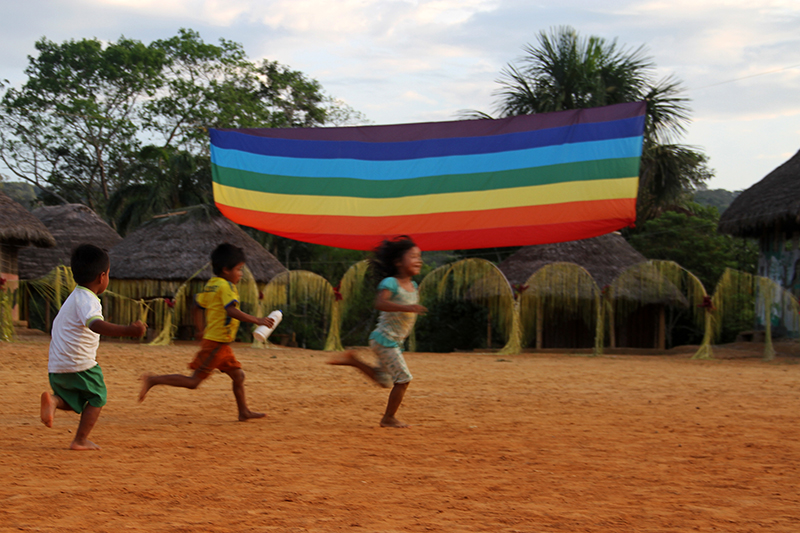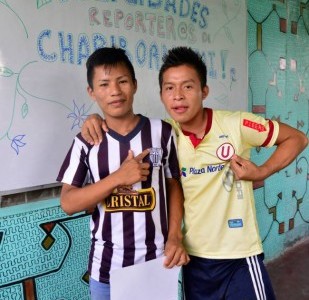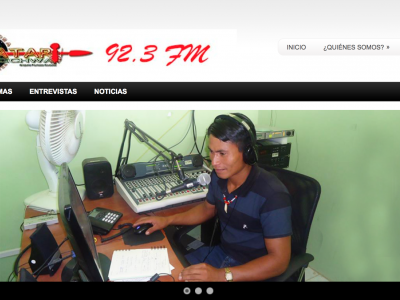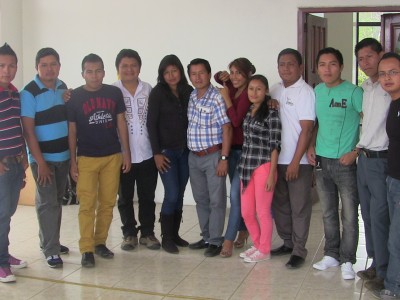Rising Voices Grantee Project Update

Sarayaku community. Photo provided by project.
Sarayaku.
The word conjures up many images beyond its meaning from translation from the Kichwa language (sara = corn, yaku = water). The first image is that of a community resisting oil companies from entering their territory for more than 15 years. It is also an image of a people that went to the Inter-American Court of Human Rights demanding that their rights be respected, which left a precedent for all indigenous peoples from around the world regarding respecting an informed prior consultation, as well as respect for their lives and territory. The third image is that of a full theater and of an indigenous filmmaker Eriberto Gualinga, telling a captivating story through images.
And we will build the fourth image through this project: Sarayaku youth, along with other indigenous youth from the Southern Amazon in Ecuador will tell their digital video stories of resistance and their alternative proposal called Sumak Allpa (Forest Alive) in defense of their territories against the XI Oil Round, which seeks to provide concessions for oil extraction in large sections of ancestral territory belonging to seven indigenous nations located in the Southern Amazon in Ecuador. Young people will share their images through free online tools and many eyes of the world will be watching the same image.
To build this, we will take a canoe, and if the river is high then our trip will take four hours. If the river is low, it may take up to 11 hours. To arrive to Sarayaku, there are no highways, and the only option is to travel by small plane or by canoe.
In the community of Sarayaku where cement and zinc are not welcome, even when they are brought for free by the government or by development, Eriberto, José, Tayta Sabino, Doña Corina, Ebelio, Nina, and many more wait for us sharing chicha (a corn-based drink) and if the fishing was good that day, then with a meal of fish, cassava, and vegetables.
It is likely that on the following day, there will be someone from a faraway city or country or even continent who found out that there will be a workshop in Sarayaku. That happens because Traya, Ebelio or another youth published a photo of the workshop on social media. Sarayaku, a community in the middle of the Ecuadorian Amazon, does not have roads because the community opposes their construction because they know that roads do not come by themselves. They also come with companies and with that the division of territory and of their community.
So Sarayaku said no to the roads, but said yes to the internet. The communication leaders use the internet to make decisions, to influence, and to be present while the children and young people use it for their studies and of course, check social media, publish photos, watch videos, just like any other young person around the world.
The videos that we will build collectively and with a methodology of community filmmaking will be shared on the internet on the website of Sarayaku and on the social media accounts of the participating youth. This will help to amplify the voices and of images of a people that propose another way of life, another way of development.
Follow along with the process on the Sarayaku website, the blog of El Churo, and on Twitter (@elchuro) and (@Sarayaku_Libre).



